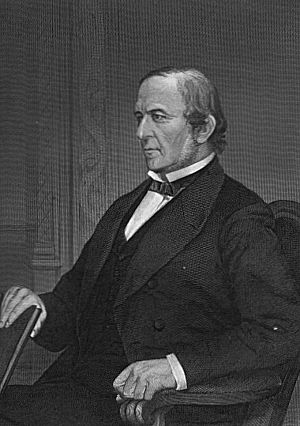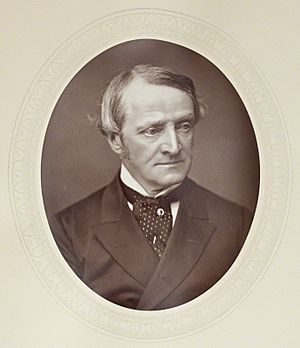Landlord and Tenant (Ireland) Act 1870 facts for kids
The Landlord and Tenant (Ireland) Act 1870 was an important law passed by the Parliament of the United Kingdom in 1870. This Act aimed to change how land was rented and managed in Ireland. It was created to give more rights and protection to farmers, known as tenants, who rented land from landowners, called landlords. Before this law, many rules about land in Ireland mostly helped the landlords.
Contents
Why This Law Was Needed
Old Laws and New Problems
For many years, laws about land in Ireland were made to benefit landlords. These laws often did not protect the farmers who rented the land. After a law in 1849, a new kind of landlord appeared in Ireland. These new landlords often bought land mainly to increase their income by raising rents. Many people thought they were even harder on tenants than the older landlords.
In 1869, a report was written about the relationship between landlords and tenants. This report showed how difficult life was for tenants because of these new landlords. It highlighted the unfairness and hardships they faced.
Gladstone's Promise for Ireland
William Ewart Gladstone led the Liberal Party. His party won the election in 1868. They had promised to bring fairness to Ireland, especially by changing the land laws.
John Bright, a member of Gladstone's government, believed that the best way to solve Ireland's land problems was to help tenants become landowners themselves. He thought this would make things much better.
However, Gladstone was not sure about the government buying huge amounts of land. He worried that if the government bought land to sell to tenants, the land might end up in the hands of a few wealthy people again later on. He felt that his plan would help all tenants, not just a few lucky ones.
Working on the New Law
From September 1869, Gladstone worked hard to understand how landlords and tenants interacted. He studied land rules in Ireland and other parts of Europe. He wanted to create a fair system for everyone.
Chichester Parkinson-Fortescue, who was in charge of Irish affairs, made a suggestion. He thought that a special tradition called the "Ulster custom" should be made into law. This custom gave tenants more security and rights. He also suggested that if a tenant was evicted without this custom, they should get money (compensation) from the landlord.
Gladstone spent three months improving Parkinson-Fortescue's idea. He wrote that he was working daily on the issue. He felt it was a very important moment for the country. He wanted to make sure the law was well-thought-out and fair. He believed that the situation in Ireland was a "disgrace" and a "danger" to the British Empire.
Passing the Bill
On February 15, 1870, Gladstone presented the new law to the House of Commons. Most members voted for it. Only 11 members voted against it. Some Irish members felt the law did not go far enough.
The debate in the House of Commons lasted for over three and a half months. Finally, the law was passed without a vote in the House of Commons and the House of Lords. On August 1, 1870, the Queen officially approved the law, and it became the Landlord and Tenant (Ireland) Act.
What the Law Said
The Landlord and Tenant (Ireland) Act 1870 had several key parts:
- Ulster Custom Becomes Law: If the "Ulster custom" or a similar tradition existed in an area, it was now officially recognized by law. This meant tenants in those areas had legal protection for their rights.
- Compensation for Improvements: Most tenants did not have the Ulster custom. For them, the law offered more security. If they made improvements to their farm, like building a barn or draining land, and then left their lease, they could get money for those improvements. Before this, landlords often claimed these improvements without paying.
- Compensation for Disturbance: Tenants could also get money (damages) if they were evicted for reasons other than not paying rent. This made it harder for landlords to evict tenants unfairly.
- John Bright Clauses: These parts of the law allowed tenants to borrow money from the government. They could borrow two-thirds of the cost to buy their farm from the landlord. They would pay back the loan with 5% interest over 35 years. However, this only worked if the landlord was willing to sell the land. The government could not force landlords to sell.
How the Law Changed Things
The historian J. C. Beckett said that the Act did not fully achieve all its goals. However, he also noted that it was a big step forward in solving the land problems in Ireland.
- Ulster Custom Challenges: The law left it up to the courts to decide where the Ulster custom existed. This meant tenants often had to prove in court that the custom applied to them.
- Impact on Tenants: The parts of the law about the Ulster custom only helped a small number of the 600,000 tenant farmers in Ireland. So, the rules about compensation for improvements and disturbance were more important for most tenants.
- Improvements for Tenants: The rules about paying for improvements were better than older laws. However, the process to claim this money was often complicated. Still, the law generally made it stronger for tenants to claim that improvements were their work.
- Changing Ideas of Property: An Australian historian named Philip Bull said that this law was very important. It created a new law just for Ireland, which was unusual. It also challenged the traditional English idea of property rights, showing that the government could step in to protect tenants.
See also
 | Misty Copeland |
 | Raven Wilkinson |
 | Debra Austin |
 | Aesha Ash |



